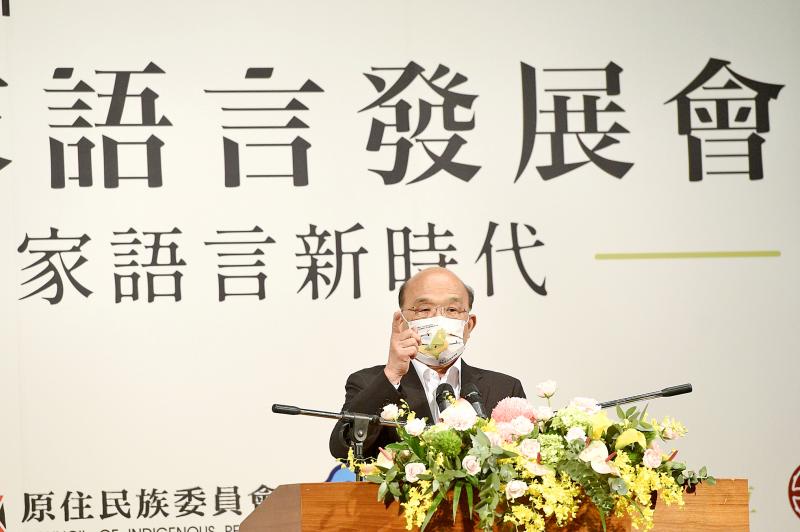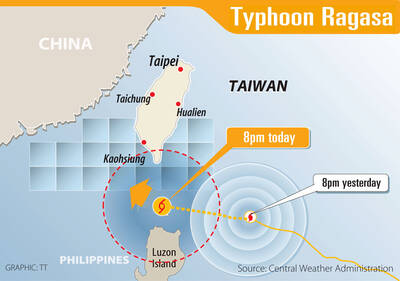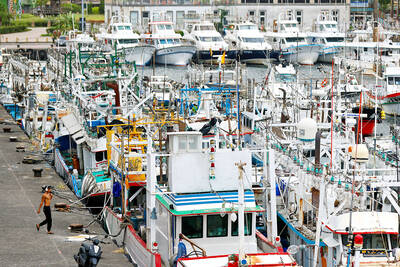Premier Su Tseng-chang (蘇貞昌) yesterday presented an outline to promote Taiwan’s native languages, as well as English, including a five-year budget of NT$30 billion (US$1.01 billion).
The new language policy has the dual purpose of recognizing Taiwan’s official languages and improving the English-language abilities of Taiwanese, Su told the weekly Cabinet meeting in Taipei.
“We are not pushing a bilingual policy [of Mandarin and English], nor will English be one of the nation’s official languages,” he said.

Photo: George Tsorng, Taipei Times
Groups last month said that English was being elevated at the expense of Taiwan’s diverse languages, which are in severe decline.
“During authoritarian rule under the one-party state dictatorship, Taiwan’s native languages were suppressed, but they survived,” Su said.
“However, even with the suppression removed, the native languages are facing rapid erosion while the cultures they come from are gradually dying out.”
“We are at a critical time for the endangered native languages of Taiwan,” he said.
“The government is determined to pool resources to revitalize and sustain our nation’s native languages for future generations,” he said.
The plan is to focus on programs to record the words of elders and native speakers, compile a database of Taiwan’s languages and regional vernacular, organize speech contests and cultural activities, and sponsor training for teachers and parents to promote the use of such languages at home, Su said.
“We will endeavor to preserve and revitalize Taiwan’s native languages,” Su said.
Students will have English-language classes each week, the Ministry of Culture said.
However, the government would not mandate that schools teach mathematics, history and other core courses in English, the ministry said.
The ministry has said Taiwan Sign Language, as well as Hokkien, Hakka, the indigenous languages, and Mindong dialect on Matsu are at risk of disappearing.
In a statement issued after the Cabinet meeting, the ministry said that a coordinated effort by government agencies, rather than the government’s previous piecemeal approach, is needed to preserve Taiwan’s languages.
Additional reporting by CNA

One of two tropical depressions that formed off Taiwan yesterday morning could turn into a moderate typhoon by the weekend, the Central Weather Administration (CWA) said yesterday. Tropical Depression No. 21 formed at 8am about 1,850km off the southeast coast, CWA forecaster Lee Meng-hsuan (李孟軒) said. The weather system is expected to move northwest as it builds momentum, possibly intensifying this weekend into a typhoon, which would be called Mitag, Lee said. The radius of the storm is expected to reach almost 200km, she said. It is forecast to approach the southeast of Taiwan on Monday next week and pass through the Bashi Channel

WARNING: People in coastal areas need to beware of heavy swells and strong winds, and those in mountainous areas should brace for heavy rain, the CWA said The Central Weather Administration (CWA) yesterday issued sea and land warnings for Typhoon Ragasa, forecasting that it would continue to intensify and affect the nation the most today and tomorrow. People in Hualien and Taitung counties, and mountainous areas in Yilan and Pingtung counties, should brace for damage caused by extremely heavy rain brought by the typhoon’s outer rim, as it was upgraded to a super typhoon yesterday morning, the CWA said. As of 5:30pm yesterday, the storm’s center was about 630km southeast of Oluanpi (鵝鑾鼻), Taiwan’s southernmost tip, moving northwest at 21kph, and its maximum wind speed had reached

The Central Weather Administration (CWA) yesterday said that it expected to issue a sea warning for Typhoon Ragasa this morning and a land warning at night as it approached Taiwan. Ragasa intensified from a tropical storm into a typhoon at 8am yesterday, the CWA said, adding that at 2pm, it was about 1,110km east-southeast of Oluanpi (鵝鑾鼻), Taiwan’s southernmost tip. The typhoon was moving northwest at 13kph, with sustained winds of up to 119kph and gusts reaching 155kph, the CWA Web site showed. Forecaster Liu Pei-teng (劉沛滕) said that Ragasa was projected to strengthen as it neared the Bashi Channel, with its 200km

PUBLIC ANNOUNCEMENTS: Hualien and Taitung counties declared today a typhoon day, while schools and offices in parts of Kaohsiung and Pingtung counties are also to close Typhoon Ragasa was forecast to hit its peak strength and come closest to Taiwan from yesterday afternoon through today, the Central Weather Administration (CWA) said. Taiwan proper could be out of the typhoon’s radius by midday and the sea warning might be lifted tonight, it added. CWA senior weather specialist Wu Wan-hua (伍婉華) said that Ragasa’s radius had reached the Hengchun Peninsula by 11am yesterday and was expected to hit Taitung County and Kaohsiung by yesterday evening. Ragasa was forecast to move to Taiwan’s southern offshore areas last night and to its southwestern offshore areas early today, she added. As of 8pm last night,